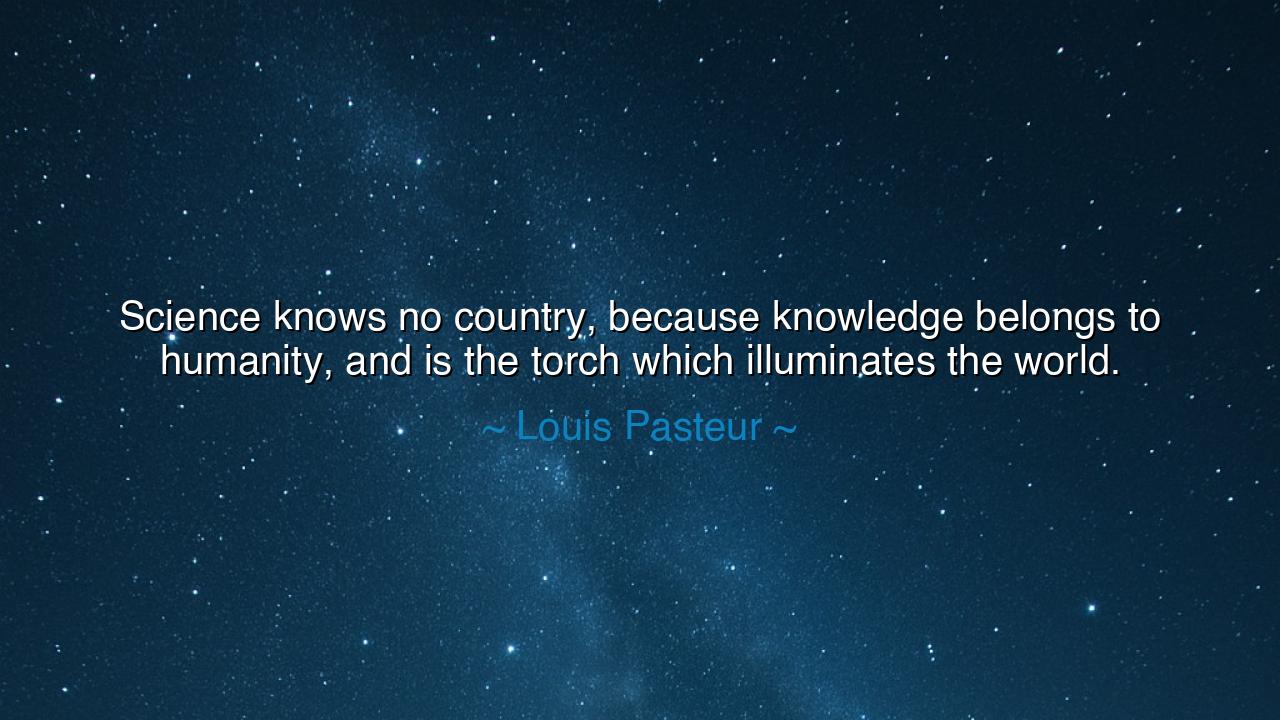
Science knows no country, because knowledge belongs to humanity
Science knows no country, because knowledge belongs to humanity, and is the torch which illuminates the world.






Louis Pasteur, the healer of nations and defender of life, once proclaimed: “Science knows no country, because knowledge belongs to humanity, and is the torch which illuminates the world.” These words shine like fire across the ages, declaring that science is not the possession of kings or borders, but the inheritance of all humankind. Truth, once discovered, cannot be locked within the walls of a single nation; it is a flame that longs to spread, to bring light wherever darkness dwells.
The ancients would have recognized this truth. In Greece, scholars like Archimedes and Hippocrates laid foundations of mathematics and medicine that were carried across centuries, far beyond the borders of their city-states. In the libraries of Alexandria, knowledge was gathered from Egypt, India, Babylon, and Greece, for the wise understood that the pursuit of truth has no allegiance but to humanity itself. Pasteur’s words echo this ancient vision: that the quest for knowledge is a sacred trust belonging to all peoples and all times.
Pasteur himself lived this truth. In an age when disease ravaged cities and ignorance cost countless lives, he uncovered the mysteries of microbes, of fermentation, and of vaccination. When he developed the rabies vaccine, he did not hold it for France alone, though he was her son; he gave it to the world, saving children, soldiers, and villagers in lands far from his own. For him, science was not a weapon of nationalism but a gift of humanity—a torch to be shared, not hidden.
History gives us other shining examples. When Jonas Salk discovered the polio vaccine, he refused to patent it. Asked who owned the rights, he replied, “Well, the people, I would say. There is no patent. Could you patent the sun?” In that moment, he embodied Pasteur’s vision. For knowledge, once revealed, belongs not to the few, but to the many. It is the torch that illuminates the whole world, lifting not just one nation but the entire human family.
Yet Pasteur’s words also carry a warning. Too often, nations have sought to bind knowledge to their own power, hoarding discoveries as weapons or using science to divide rather than unite. The race for the atomic bomb, born from science, brought not illumination but shadow. Here we see the truth: when the torch of science is used for domination, it becomes fire that consumes rather than light that guides. The challenge of humanity is not only to discover knowledge but to share it wisely, so that it heals rather than harms.
The lesson, then, is clear: seek knowledge not for pride, not for profit, not for the glory of a single people, but for the good of all. Recognize that your learning rests upon the work of countless others across cultures and centuries, from forgotten scribes to nameless laborers. Each book you open, each fact you learn, is a spark passed down through the ages. To honor that gift is to use it in service of the human whole.
Practical actions arise from this wisdom. Support the sharing of education and science across borders. Celebrate the discoveries of others, even those beyond your nation or tradition. Pursue your own learning with the awareness that you are a link in a chain far greater than yourself. And above all, let your knowledge be a light for others, not a tool for division.
Thus, children of the future, carry Pasteur’s torch within you. Science knows no country, for knowledge belongs to humanity. Guard it, grow it, and share it, that the world may shine brighter with each passing generation. For in every discovery, no matter how small, there is light. And the more we share that light, the less darkness remains in the world.






AAdministratorAdministrator
Welcome, honored guests. Please leave a comment, we will respond soon